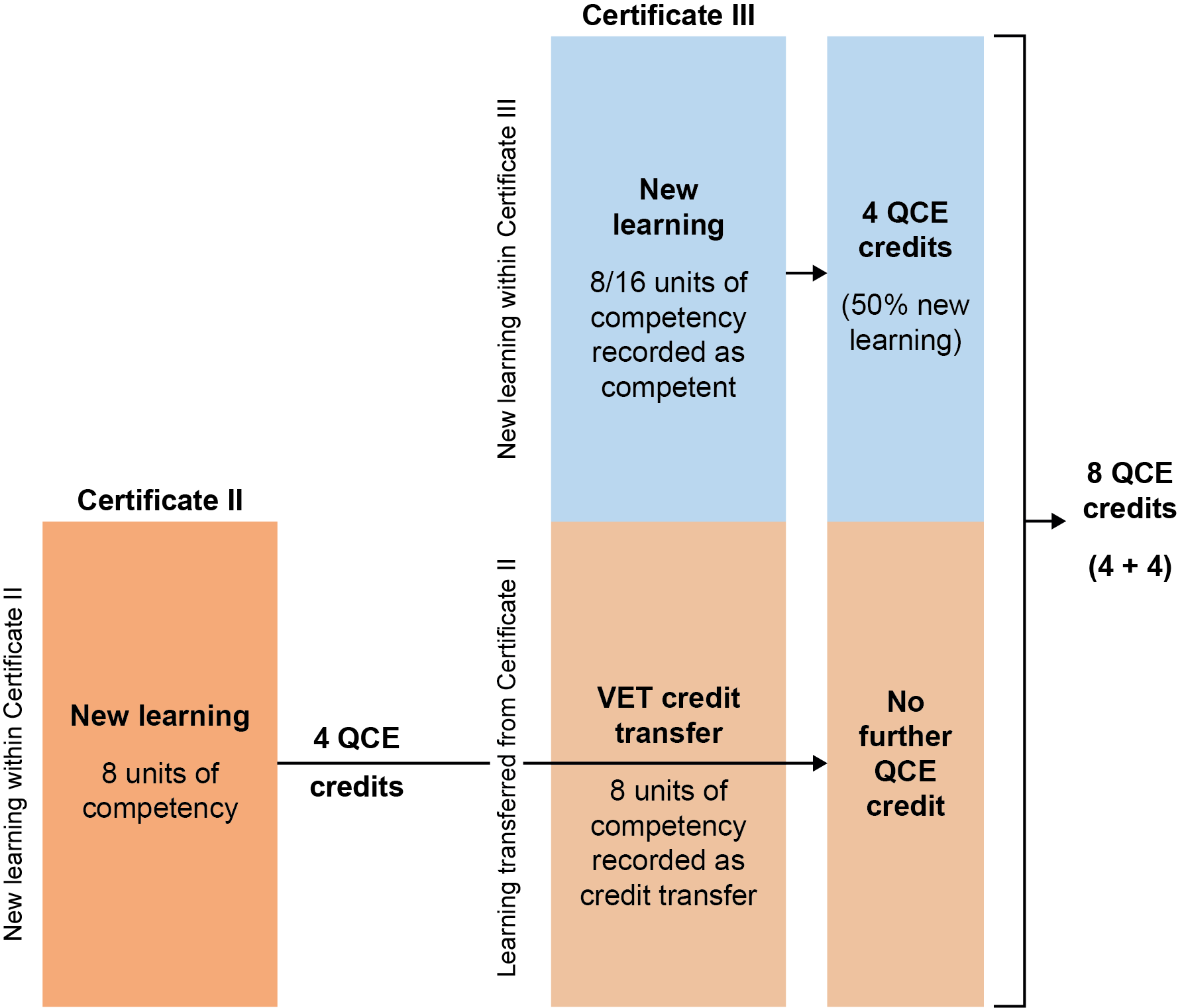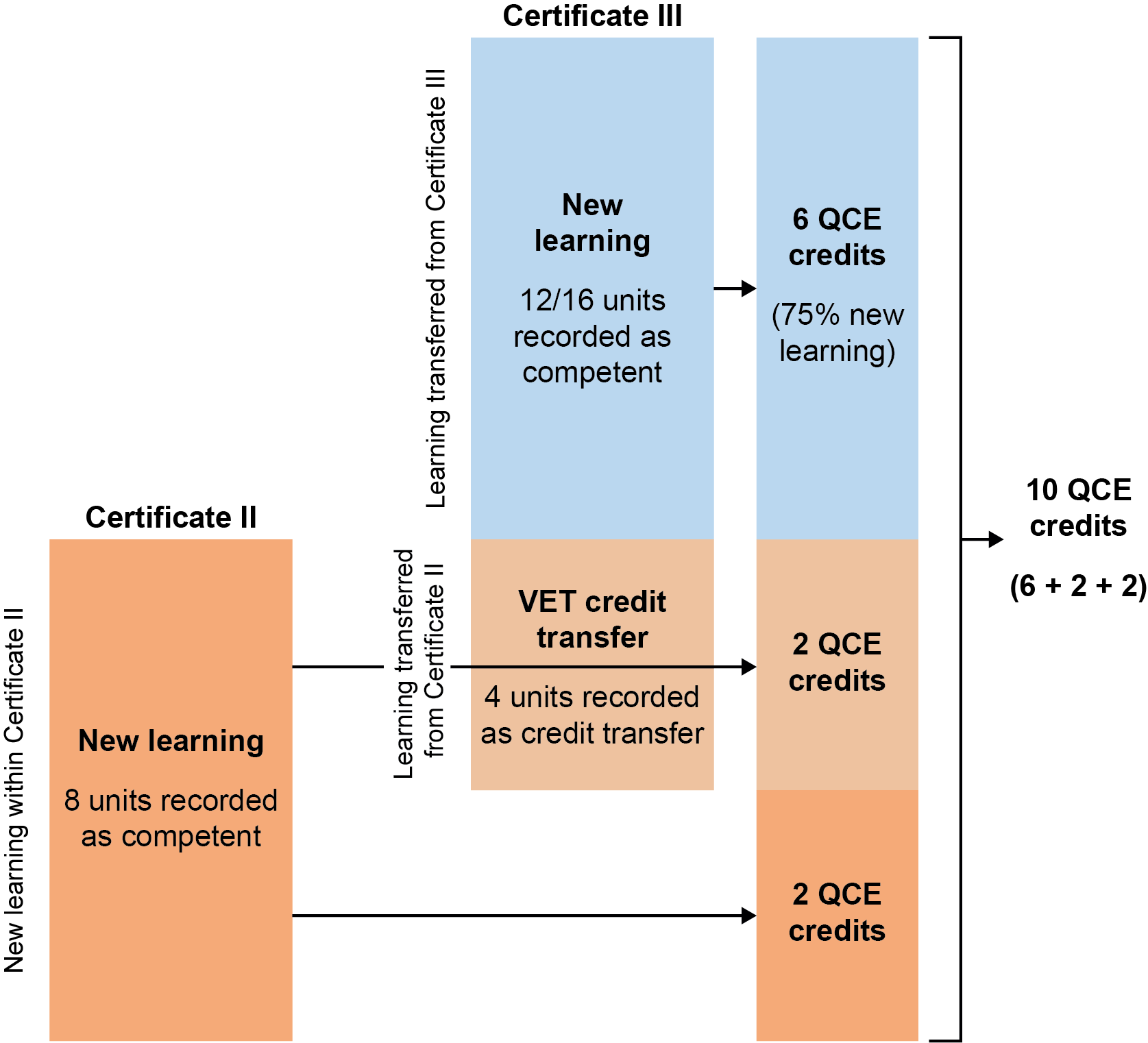VET has an important role in many senior secondary student pathway options. The QCAA recognises completion and partial completion of VET qualifications and assigns credit to the QCE appropriate to the amount of learning completed by a student.
To ensure breadth of learning within a QCE, credit will accrue for new learning only. The QCAA has identified a number of instances where available learning options include a duplication of learning. These are outlined below.
There are many combinations of learning options available in the set pattern requirement of the QCE; only courses listed by the QCAA as duplication of learning are outlined in this handbook. If a course is not listed, it is currently not identified as duplication of another learning option, e.g. General subjects or Certificate III qualifications.
2.3.1 Applied subjects and Certificate II VET qualifications with duplication of learning
The QCAA considers Applied subjects and VET qualifications at Australian Qualifications Framework (AQF) Level 2 that have similar subject matter and learning goals to be duplication of learning.
Students may enrol in any VET qualification. However, when a student is enrolled in both the identified Applied subject and VET qualification that has been listed as having similar learning, credit for the QCE is determined by the QCAA. Relevant Applied subjects and related qualifications are identified in the table ‘Applied subjects and Certificate II VET qualifications with duplication of learning’. Students may enrol in a combination of these courses; however, where duplication has been identified, QCE credit will only accrue for one course, i.e. a maximum of four QCE credits. At the time of enrolment, the list of courses in the table applies. This list of subjects and qualifications is reviewed and updated annually. If a qualification on this list is superseded, the new qualification will also be considered ‘duplication of learning’ unless otherwise advised.
All completed and partially completed VET qualifications and Applied subjects are recorded on the Senior Statement and/or Statement of Results.
| Learning area | Applied subject | VET qualification | Max. QCE credit |
|---|---|---|---|
| English | Essential English | No duplication | 4 |
Health and Physical Education | Early Childhood Studies | No duplication | 4 |
Sport & Recreation | SIS20115 Certificate II in Sport and Recreation | 4 | |
Humanities and Social Sciences | Business Studies | BSB20120 Certificate II in Workplace Skills | 4 |
Religion & Ethics | No duplication | 4 | |
Social & Community Studies | No duplication | 4 | |
Tourism | SIT20116 Certificate II in Tourism | 4 | |
Mathematics | Essential Mathematics | No duplication | 4 |
Sciences | Agricultural Practices | AHC20116 Certificate II in Agriculture | 4 |
Aquatic Practices | No duplication | 4 | |
Science in Practice | No duplication | 4 | |
Technologies | Building & Construction Skills | CPC20220 Certificate II in Construction Pathways | 4 |
Engineering Skills | MEM20422 Certificate II in Engineering Pathways | 4 | |
Fashion | MST20722 Certificate II in Apparel, Fashion and Textiles | 4 | |
Furnishing Skills | MSF20522 Certificate II in Furniture Making Pathways | 4 | |
Hospitality Practices | SIT20316 Certificate II in Hospitality | 4 | |
Industrial Graphics Skills | No duplication | 4 | |
Industrial Technology Skills | MSM20216 Certificate II in Manufacturing Technology | 4 | |
Information & Communication Technology | ICT20120 Certificate II in Applied Digital Technologies | 4 | |
The Arts | Arts in Practice | No duplication | 4 |
Dance in Practice | CUA20120 Certificate II in Dance | 4 | |
Drama in Practice | No duplication | 4 | |
Media Arts in Practice | No duplication | 4 | |
Music in Practice | CUA20620 Certificate II in Music | 4 | |
Visual Arts in Practice | CUA20720 Certificate II in Visual Arts | 4 | |
| Note: If a qualification on this list is superseded, the new qualification will be considered ‘duplication of learning’ unless otherwise advised. | |||
2.3.2 Multiple VET qualifications
To ensure breadth of learning within a QCE, limitations are placed on the amount of credit that can contribute to the QCE for some VET qualifications.
New learning in VET
Credit for the QCE accrues when a student completes new learning. When a student completes multiple VET qualifications, an RTO may credit transfer previously completed units of competency from one qualification to another qualification. New learning in VET is identified for a unit of competency when it is reported as:
- ‘Competency achieved/pass' and is the earliest date completed
- 'Credit transfer/national recognition' but has not been recorded elsewhere in the student’s learning account, and is the earliest date completed
- 'Credit transfer/national recognition' but at the earliest date completed was not part of a qualification that can contribute credit to the QCE.
Credit transfer relates to learning in VET qualifications, which is different from credit contributing to a QCE.
Qualifications from the same VET training package
A maximum of eight credits from the same VET training package can contribute to a QCE. Credit in the Core category of learning will accrue as the priority.
When a student completes or partially completes multiple qualifications from the same VET training package (e.g. a Certificate II in Business and a Certificate III in Business, or a Certificate II in Sport & Recreation and a Certificate III in Fitness), credit accrued from new learning in the Core category of learning will contribute credit, in the first instance, to a QCE. For the maximum credit to accrue for the highest-level qualification, at least 90% (or all but one of the units of competency) must be new learning.
A student who completes only a Certificate I from a training package accrues credit in the Preparatory category of learning. A student who completes only a Diploma or Advanced Diploma while at school accrues credit in the Complementary category of learning.
All completed qualifications are recorded on the Senior Statement and/or Statement of Results.
The QCE estimator is available in the Student Management application.
Certificate I | Certificate II | Certificate III or Certificate IV | Category of learning | Maximum QCE credit |
|---|---|---|---|---|
Qualification completed | Preparatory | 2–3 | ||
Qualification completed | Core | 4 | ||
Qualification completed | Core | 4–8 | ||
Qualification completed | Qualification completed | Core | 5–8 | |
Qualification completed | Qualification completed | Preparatory Core | 4–7 (2–3 from Preparatory plus up to 4 from Core) | |
Qualification completed | Qualification completed | Qualification completed | Core | 5–8 |
Qualification completed | partially completed | Core | 4 from Certificate II (0–4 additional credit from partial completion of the Certificate III accrues for new learning) |
VET credit transfer
Credit accrues to the QCE when a student completes new learning, as defined above.
At least 90% of the total units of competency required for the qualification must be reported as competent. All completed and partially completed VET qualifications that contribute to the QCE are recorded on the Senior Statement and/or Statement of Results.
The following table outlines the credit that contributes to a QCE when a VET qualification is completed or partially completed, and units of competency are recorded as VET credit transfer.
QCE credit | Amount of new learning completed | Notes |
|---|---|---|
Full QCE credit | 90% or more | 10% of the total units of competency, or one of the competencies, can be reported as credit transfer. For Certificate I, the qualification must also be completed and awarded. |
75% | 75% | Applicable to Certificate II, Certificate III and Certificate IV qualifications only. |
50% | 50% | Applicable to Certificate II, Certificate III and Certificate IV qualifications only. |
25% | 25% | Applicable to Certificate II, Certificate III and Certificate IV qualifications only. |
0% | <25% |


2.3.3 Diploma and Advanced Diploma qualifications
Diploma and Advanced Diploma qualifications represent learning that complements core learning undertaken during senior schooling and may provide valuable pathway options for many students. Credit for a Diploma or Advanced Diploma may be accrued to the QCE in the Complementary category of learning.
If a student completes a Diploma or Advanced Diploma qualification, the QCE credit is applied only when:
- the qualification is undertaken while the student is enrolled at a school
- units of competency are at AQF Level 5 or above
- the maximum credit from the same training package has not already been met in the Core category of learning.
If a student has not accrued the maximum credit from a training package (eight credits) and completes or partially completes a Diploma or Advanced Diploma, the remaining credit available in the training package is accrued in the Complementary category of learning. When eligible, Diploma and Advanced Diploma qualifications accrue one credit per unit of competency completed, up to a maximum of eight credits. Credit may accrue for the completed qualification or partial completion of the qualification.
All completed qualifications are recorded on the Senior Statement and/or Statement of Results.
Resources available in the QCAA Portal Noticeboard provide examples of QCE credit contribution in the Core and Complementary categories of learning when a Diploma or Advanced Diploma is completed.


